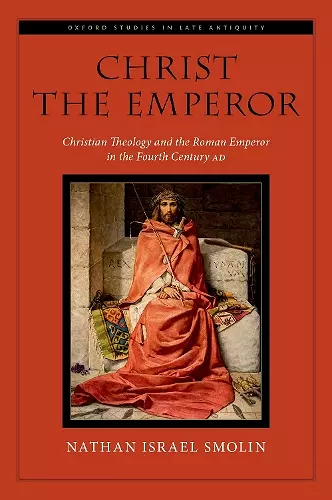Christ the Emperor
Christian Theology and the Roman Emperor in the Fourth Century AD
Format:Hardback
Publisher:Oxford University Press Inc
Published:29th Aug '24
Currently unavailable, our supplier has not provided us a restock date

Politics and diplomacy have always been as much about the social and cultural contexts within which political actors operate as they are about the political structures themselves. This was also true of the Roman Empire of the fourth century AD, ruled by the Emperor Constantine the Great--a society marked by social, religious, and political transformation as the empire came under the influence of the Christian Church. Studies of this period often note the difficulty of understanding its politics due to a lack of sources that discuss questions central to political theory. This has led to deprecating views of the Late Empire as an age of unquestioning despotism, political decline, and social decay. Recent scholarship has correctly pushed back against this viewpoint, emphasizing the vibrancy of art, architecture, and social life during this period; however, relatively little attention has yet been given to the deeply consequential effects of Christian theology on the period's politics. Christ the Emperor argues that the alleged absence of explicit political theorizing in fourth century texts is the result of a migration of these discourses from the realm of "secular" politics to that of public Christian theology, where questions fundamental to political theory were analyzed and debated in more far-reaching ways than ever before. When fourth century bishops and Emperors wished to discuss the pressing questions of legitimacy, succession, hierarchy, equality, unity, diversity, and power, they did so largely in and through Christian theology. To understand how these political and social actors thought about and enacted political theory, Nathan Israel Smolin turns to theological sources. In doing so, he reveals this period as one of profound political, social, and religious ferment, in which ideas and structures fundamental to the history of the following millennia were developed and contested--ideas that continue to shape our world today.
A brilliant book. Smolin's premise is original, and highly interesting: as a usurper, Constantine needed to justify his rule, and after casting his lot with the formerly oppressed Christians, he developed a theology in which he became the 'cosmic emperor,' playing the same role on earth that the Christian god played in the universe. * Harold Drake, University of California, Santa Barbara *
[Smolin] contributes to scholarship that has tried to elucidate the complex relationship between the Constantinian dynasty and the Christian Church. By considering a variety of sources, he provides helpful insights into how the emperor's status and self-image, as well as the perception of cosmic dominion, are reflected in contemporary theological sources and thus offers some new ideas to 'political theology' in the fourth century. * Bryn Mawr Classical Review *
By considering a variety of sources, he provides helpful insights into how the emperor's status and self-image, as well as the perception of cosmic dominion, are reflected in contemporary theological sources and thus offers some new ideas to 'political theology' in the fourth century. * Charlotte Kirsch-Klingelhöffer, Bryn Mawr Classical Review *
To make such a topic understandable would have been accomplishment enough; to have made it both readable and even relevant is worthy of high praise, indeed. * Shawn Phillip Cooper, The European Conservative Magazine *
When reading Smolin, the sense of his absolute command of the scholarship is constantly present, supported by the author's exceptional facility for explaining the complex relationship of 4th century theology and politics. To make such a topic understandable would have been accomplishment enough; to have made it both readable and even relevant is worthy of high praise. * Shawn Phillip Cooper, The European Conservative Magazine *
ISBN: 9780197689547
Dimensions: 235mm x 164mm x 30mm
Weight: 699g
392 pages